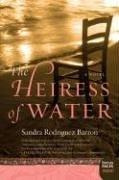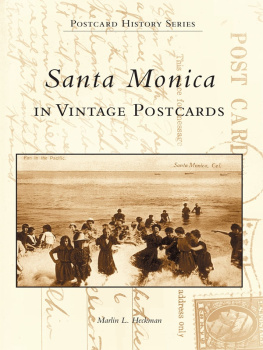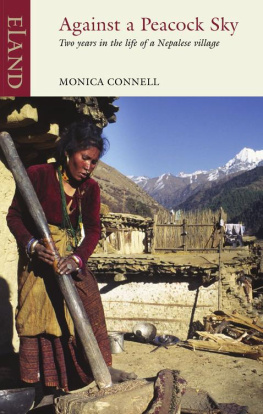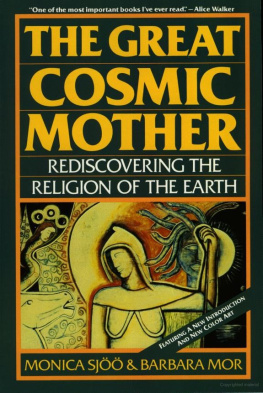THE HEIRESS of WATER
A NOVEL
Sandra Rodriguez Barron

FOR BOB AND PATRICK
Contents
The tropical oceans contain over five hundred different species of cone snails. Conus prey upon other marine organisms by firing venoms that can induce paralysis or death in seconds. Some species are so lethal that they can kill a human adult in a matter of hours.
In recent years, scientists have discovered that cone venom has extraordinary pharmacological qualities. Each species of cone snail contains an arsenal of peptides (small protein fragments) that exhibit powerful, highly selective activity on nerves. By blocking the passage of electrically charged particles in and out of cells, the toxins effectively shut down messages between the brain and muscles. Recently, the FDA approved a laboratory-made equivalent of the compound found in the venom of the Australian Conus magus, a painkiller a hundred to a thousand times more powerful than morphine. Equally as important is its staying power: since its not a narcotic, the body cant develop immunity to its effects. Other cone toxin combinations are being studied to address more elusive conditions such as mental illness, neurodegenerative diseases, and traumatic head injury.
The development of cone venom as medicine is clearly in its infancy and faces many obstacles. For starters, some venom combinations have plagued trial subjects with adverse side effects. The risks in introducing cone venom into subjects who have suffered a head trauma has made experimentation in this area exceedingly difficult. Still, several biopharmaceutical companies around the world have fast-tracked their plans to decode the healing potential of Conus toxins.
In addition to their vast promise as a source of new drugs, cones are valued by collectors for their beautiful, elaborately patterned shells.
Three species described in this novelConus furiosus, Conus exelmaris, and Hexaplex bulbosaare fictional.
I SHALL THROW AWAY THIS THING THAT I have found as one throws away a cigarette stub. This seashell has served me, suggesting by turns what I am, what I know, and what I do not know. Just as Hamlet, picking up a skull in the rich earth and bringing it close to his living face, finds a gruesome image of himself this little, hollow, spiral-shaped calcareous body summons up a number of thoughts, all inconclusive.
PAUL VALRY , Sea Shells
EL SALVADOR, 1981
Alma Borrero Winters believed that everything in life begins and ends with the ocean. The ocean is the expression of God on earth she told her daughter, as she pushed open a set of wrought-iron gates. She shaded her eyes and strode onto Negrarena, a desolate expanse of black sand that spilled into the Pacific Ocean in the distance. She turned and clasped Monicas small hand. Take a deep breath. Go on, smell it. Breathe deep.
Monica happily obeyed, filling her lungs with the rich smells of the sea. Somethings different today.
You can smell that?
Monica nodded.
The currents are combing over the fields of seaweed from the west, Alma said, turning to look down at Monica. Im impressed.
They walked in silence, their rubber sandals slapping at their heels. When they were halfway across the expanse of sand, Alma noticed that Monica was trying to conceal something in one of her hands, and Alma leaned back to see what it was. Monica veered away but her mother grabbed hold of her arm. What are you hiding?
Monica handed over a small in memoriam card. They had been distributed at her grandfathers novenario, the nine Catholic masses of mourning, now a full month past. On one side of the card was a pale, pastel-colored image of a bearded deity sitting on a cloud suspended by winged cherubs. On the flip side of the card was a black-and-white photo of Almas father and a short biography of his life.
Adolfo Borrero had died peacefully of a heart attack, and hundreds of people had attended the vigil for the repose of his soulfamily, friends, the elite of Salvadoran society, domestic staff and workers from the Borrero plantations and from Borr-Lac, their dairy plant. All nine of his masses at La Divina Providencia parish had been filled well beyond the grand churchs capacity with mourners and the curious. On several occasions, Monica had heard people comment that her grandfather would have made a great president. He would have cleaned out the communists once and for all, an elderly man lamented as he stood in front of the coffin. Almas response had been, Then El Salvador must be pretty desperate for a hero.
Everything Alma despised about the society she had been born into was somehow contained in the traditional prayer cards that her mother had dutifully ordered for the service. Monica, on the other hand, treasured them with equal ferocity. I know you miss Abuelo, Alma said. But dont reduce your memories of himor your vision of Godto this ridiculous card, she said, holding it up.
Everyone else does, Monica protested, her face reddening as she turned away from her mother. And nobody else believes in all that crazy ocean stuff but you.
Alma opened her eyes wide. And you.
Monica shrugged.
Alma flicked the face of the card with two fingers. This depiction of God sitting on a cloud, bearing a striking resemblance to Santa Claus, is an insult to your intelligence. And with that she ripped the card in half, then turned it sideways and tore it again. God is so much more than this silly illustration. Alma held up the scraps. Think of it, Monica. How can infinity have a form? And to give him a human form, of all ridiculous things. She lowered her voice to a whisper, which annoyed Monica, since they were completely alone on a private beach surrounded by a thousand acres of farmland. God has no memory, no shape, no conscience. He just is. Alma lifted her eyelids, revealing a pair of black irises reflective and impenetrable as polished granite. She placed one hand under her daughters chin, swiveling Monicas face toward the expanse of water.
He just is. Like the ocean just is, Monica parroted, rolling her eyes and imitating her mothers overly dramatic whisper.
Good, Alma said, giving Monicas ponytail a tug. Since neither of them had pockets, Alma stuffed the scraps of the prayer card into the left triangle of her striped-blue-and- green Brazilian bikini top. Monica experienced a vague discomfort at the idea that both her late grandfather and the Almighty Father were inside her mothers swimwear.
On this particular day, Alma and Monica had chosen to walk on the rugged side of the coast. Their starting pointthe sprawling Borrero retreat named Villa Caracolwas halfway between the placid, smooth black-sand beaches of the northern coast and the pockmarked moonscape of the southern coast. The beach and the thousand acres of farmland that surrounded it was collectively known as Negrarena. Most of the Borreros and their guests invariably favored the smooth beach, but the south was a special place for Alma and Monica to explore. It was a beachcombers dream, with its lava-rock tide pools teeming with marine life. Monica was glad to shift the subject away from religion. Growing excited as she eyed a nearby tidepool, she said, Mami, I can name all the creatures in the tide pool.
They crouched down together.
Monica began. Moluscos. Common names concha de abanico casco de burro almeja piedra ostra comn . All of these are bivalves, she said, accustomed to switching without awareness between Spanish and English like her parents.
Next page












